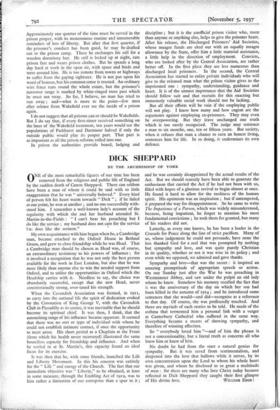DICK SHEPPARD
BY THE ARCHBISHOP OF YORK ONE of the most remarkable figures of our time has been removed from the religious and public life of England by the sudden death of Canon Sheppard. There can seldom have been a man of whom it could be said with so little exaggeration that he was " universally beloved." Every kind of person felt his heart warm towards " Dick " ; if he failed at one point, he won at another ; and no one successfully with- stood him. I remember a well-known lady's account of the regularity with which she and her husband attended St. Martin-in-the-Fields : " I can't bear his preaching but I do like the service ; my husband does not care for the service tut does like the sermon."
My own acquaintance with him began when he, a Cambridge man, became attached to the Oxford House in Bethnal Green, and grew to close friendship while he was Head. That a Cambridge man should be chosen as Head was, of course, an extraordinary testimony to his powers of influence ; for it involved a recognition that he was not only the best person available for the work in East London, but also that he was more likely than anyone else to win the needed support from Oxford, and to utilise the opportunities in Oxford which the Headship carries with it. Needless to say, the choice was abundantly successful, except that the new Head, never constitutionally strong, over-taxed his strength.
When the Cavendish Association was formed, in 1911, to carry into the national life the spirit of dedication evoked by the Coronation of King George V, with the Cavendish Club in Piccadilly as its centre, it was inevitable that he should become its spiritual chief. It was then, I think, that the astonishing range of his influence became apparent. It seemed that there was no sort or type of individual with whom he could not establish intimate contact, if once the opportunity to meet arose. His short period as a Chaplain at the Front (from which his health never recovered) illustrated the same boundless capacity for friendship and influence. And when he settled in at St. Martin's, this capacity found an ideal focus for its exercise.
It was then that he, with some friends, launched the Life and Liberty Movement. In this his concern was entirely for the " Life " and energy of the Church. The fact that our immediate objective was " Liberty," to be obtained, at least in some measure, through the Enabling Act of 1919, was to him rather a limitation of our enterprise than a spur to it ; and he was certainly disappointed by the actual results of the Act. But we should scarcely have been able to generate the enthusiasm that carried the Act if he had not been with us, filled with hopes of a glorious revival to begin almost at once. He found it hard to allow for the tardiness of the human spirit. His optimism was an inspiration ; but if untempered, it prepared the way for disappointment. So he came to write The Impatience of a Parson, which was widely misunderstood, because, being impatient, he forgot to mention his most fundamental convictions ; he took them for granted, but many of his readers did not.
Latterly, as every one knows, he has been a leader in the Crusade for Peace along the line of strict pacifism. Many of us, whose judgement he could not persuade; have none the less thanked God for a zeal that was prompted by nothing but sympathy and love, and was quite purely Christian in its quality, whether or not it was wise in its policy ; -and even while we opposed, we admired and gave thanks.
Sympathy and love—that was the secret : it inspired an amazing promptitude of appropriate speech or action.- On one Sunday just after the War he was preaching in Westminster Abbey, and saw under the pulpit an old lady whom he knew. Somehow his memory recalled the fact that it was the anniversary of the day on which her son had been killed in the autumn of 1914 ; and he introduced some sentences that she would—and did—recognise as a reference to that day. Of course, she was profoundly touched. And there are myriads of such stories to be told. He made of the asthma that tormented him a personal link with a verger at Canterbury Cathedral who, suffered in the same way. Everything became a means of showing sympathy, and therefore of winning affection.
So " everybody loved him "—and of him the phrase is not a conventionality, but a literal truth as concerns all who knew him or knew of him.
No doubt he had from the start a natural genius for sympathy. But it was saved from sentimentalism, and deepened into the love that hallows while it serves, by its own concentration upon the Lord to whom his whole heart was given, and whom he disclosed to so great a multitude of men : for there are many who love Christ today because reflected in Dick Sheppard they caught their first glimpse














































 Previous page
Previous page